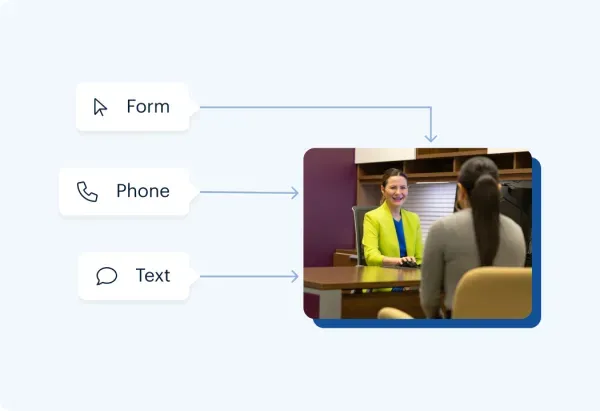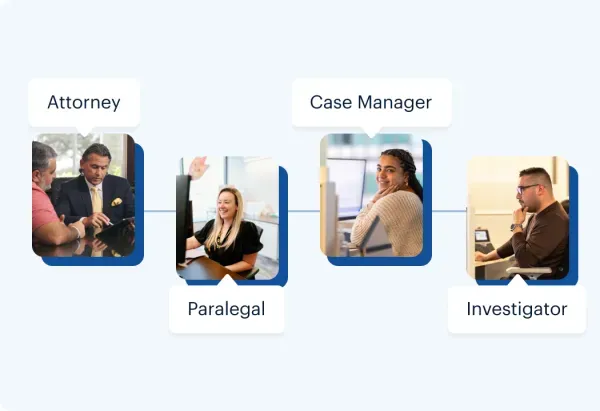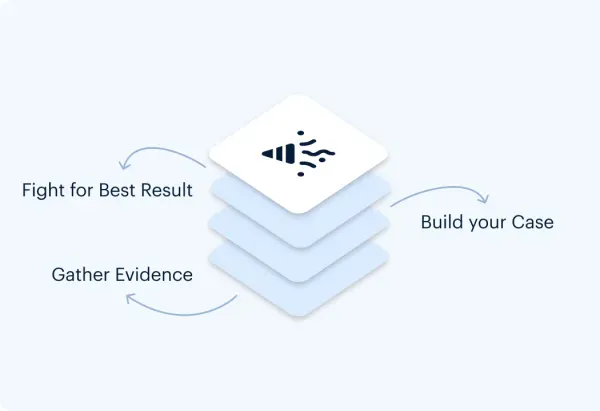Cases will be handled by attorneys licensed in the local jurisdiction. Cases may be associated with, or referred to, other law firms as co-counsel or referral counsel. Results may vary depending on your particular facts and legal circumstances. The attorney featured above is licensed in Florida. For a full list of attorneys in your state please visit our attorney page.
CHARLOTTE WORKERS' COMPENSATION ATTORNEY
Work injuries can upend your life. When you’re hurt on the job, you shouldn’t have to pick between your health, your income, or your future. At Morgan & Morgan, we fight to ensure that injured workers in Charlotte receive the medical care, wage support, and respect they deserve, even if their employer or insurance company makes that fight difficult.
Cases will be handled by attorneys licensed in the local jurisdiction. Cases may be associated with, or referred to, other law firms as co-counsel or referral counsel. Results may vary depending on your particular facts and legal circumstances. The attorney featured above is licensed in Florida. For a full list of attorneys in your state please visit our attorney page.
Charlotte Workers' Compensation
Under the North Carolina Workers’ Compensation Act, employees within the state are entitled to compensation if injured on the job. If you’re injured, you should immediately report the incident to your employer and follow your employer’s instructions regarding where to obtain medical treatment. Be sure to also file the appropriate claim form with the North Carolina Industrial Commission (“Commission”). Once your claim is approved, you should be compensated for medical expenses and, if disabled, lost wages.
But what if your employer denies your claim and you are left with medical bills and lost income? Or what if your employer’s insurance company asks you to sign a settlement agreement? That’s when you should contact the experienced workers’ compensation attorneys at Morgan & Morgan. The attorneys in our Charlotte office understand North Carolina workers’ compensation law and will work tirelessly to make sure you get all the benefits to which you are entitled. Start the process today by completing a free, no-obligation case evaluation form.
150,000+ Five Star Reviews
The reasons why clients trust Morgan & Morgan.
Results may vary depending on your particular facts and legal circumstances. Based on select nationwide reviews.
Our Results
How It Works
Unsure what to do next? With 35 years of experience, our personal
injury lawyers will guide you every step of the way.

Contact Us 24/7 - It’s Free
Start your claim

Meet your dedicated attorney
Meet the attorneys

We fight for more
Learn more about the case process
Results may vary depending on your particular facts and legal circumstances. The attorneys shown in these photos may not be licensed in your state. To find an attorney licensed in your area, please visit our attorney page.
Local Care
Backed by America’s Largest Injury Law Firm.
$30 Billion
Recovered for clients
nationwide700,000+
Clients and families
served1,000+
Attorneys across
the country1
Click may change your life
The attorney featured above is licensed in Florida. For a full list of attorneys in your state please visit our attorney page.
Results may vary depending on your particular facts and legal circumstances.
Learn More
Injured and not sure what to do next?
We'll guide you through everything you need to know.
What are my rights under North Carolina workers’ compensation?
Most employers in North Carolina with three or more employees are required to carry workers’ compensation insurance. If you’re injured at work or develop an occupational disease because of your job, you may be eligible for benefits including medical treatment and partial wage replacement.
To qualify, you generally need to show:
- The injury or illness is work-related
- It occurred during the course and scope of your job
- Your employer is covered under the state law
- The incident or exposure is properly documented
Some occupational injuries, such as repetitive stress, hearing loss, or chemical exposure, may also be covered when they result from job duties rather than a sudden incident.
What steps should I take after a workplace injury?
Timing and thorough documentation matter more than you think. Acting quickly can protect your health and your claim.
- Report the injury to your employer as soon as possible, with specifics (date, location, cause).
- Seek medical care immediately and tell the provider this injury is work-related.
- Keep copies of medical records, notes, images, prescriptions, and treatment plans for your records.
- Photograph the accident location and any hazards or safety failures.
- Retain all communication with your employer or insurer, including emails, forms, and written decisions, for future reference.
Doing these things early helps protect your claim if questions arise about the timing, severity, or legitimacy of your injury.
What types of benefits are available after a work injury?
If your workers’ compensation claim is approved in North Carolina, you may recover compensation for:
- Medical treatment (doctor visits, surgery, therapy, medications)
- Wage replacement while you’re unable to work
- Permanent disability benefits if your injury results in lasting impairment
- Mileage reimbursement for travel to medical appointments
- Death benefits if a loved one dies from a work-related injury, including funeral expenses and support for dependents
Insurers and employers may attempt to limit what they pay, which is why having strong legal representation is so important.
Can emotional or mental health injuries be covered?
Yes. Workers’ compensation can cover psychological injuries if they directly result from the workplace, such as trauma from witnessing an accident, or repeated stress or harassment. These cases often require thorough documentation from mental health professionals and may be subject to more scrutiny from insurers. But emotional harm is real, and you have the right to pursue compensation for it.
Why do workers’ compensation claims sometimes get denied?
Vanishing coverage or approval doesn’t necessarily mean your injury wasn’t valid. Common reasons for denials include:
- Missing or delayed injury report
- Disputes about whether the injury occurred at work
- Lack of witnesses or a consistent description
- Delays in seeking medical care
- Positive tests for drugs or alcohol
- Being misclassified as an independent contractor
When insurers or employers challenge your claim, that’s when legal experts must step in and push back.
What can I do when a dispute arises?
If your claim is denied, delayed, or undervalued, the North Carolina Industrial Commission provides processes for appeal and dispute resolution, including mediation, hearings, and formal proceedings.
A skilled workers’ compensation attorney can:
- Represent you at hearings before Commissioners.
- Gather evidence, medical testimony, and expert reports.
- Handle all deadlines, filings, and technical procedures.
- Negotiate or litigate for the full value of your claim.
What about settlement offers?
You might be offered a lump-sum settlement, often called a “clincher agreement.” While such offers can be tempting, especially when financial pressure mounts, they carry risks.
Before accepting:
- Be sure future medical care is preserved.
- Understand what rights you give up.
- Know how it affects other benefits (e.g., Medicare, SSDI).
- Compare it against what your full long-term needs may cost.
Once you sign, your claim is closed. Let us review it and negotiate on your behalf to ensure you don't leave money and protection on the table.
How long do I have to file a workers’ compensation claim in North Carolina?
Deadlines can make or break your case. In North Carolina, injured workers have a limited timeframe to report an accident and formally file a claim. While the exact timeline depends on the circumstances, waiting too long can give the insurer reason to deny your case.
Can I choose my own doctor after a work injury in Charlotte?
One of the biggest surprises for many injured employees is that they often don’t have the option to choose their own doctor. In North Carolina, employers and their insurance companies usually control which healthcare providers you can see for treatment under a workers’ compensation claim. If you see a doctor who’s not authorized, your bills may not be covered.
That said, you have rights. If you’re unhappy with the care you’re receiving, you can request a new doctor or a second opinion, especially if your condition isn’t improving or you believe the treatment plan is inadequate.
What happens if my employer refuses to report or acknowledge my injury?
Unfortunately, some employers try to avoid higher insurance premiums by downplaying or ignoring workplace injuries. If your employer refuses to report the accident, you still have options. You can file a claim directly with the North Carolina Industrial Commission and send notice to the insurance company yourself.
An attorney can make this process much smoother by handling communications with the insurer, gathering medical evidence, and ensuring your rights are fully protected.
How are workers’ compensation benefits calculated in North Carolina?
Workers’ compensation benefits are meant to replace a portion of your lost income while you recover. In most cases, they’re based on your average weekly wage, typically about two-thirds of what you earned before your injury, up to a state-set maximum.
Depending on your condition, you may qualify for:
- Temporary Total Disability (TTD): Weekly payments while you’re completely unable to work.
- Temporary Partial Disability (TPD): Benefits if you can work but earn less than before your injury.
- Permanent Partial Disability (PPD): Compensation for lasting impairment, based on medical evaluations.
Because every claim is different, a workers’ compensation attorney can review your records and ensure the insurance company calculates your benefits fairly.
Can I be fired for filing a workers' compensation claim in Charlotte?
No. North Carolina law prohibits employers from retaliating against employees who file legitimate workers’ compensation claims. You can’t be fired, demoted, or harassed for exercising your right to seek benefits. Unfortunately, retaliation does happen, sometimes disguised as “downsizing” or sudden disciplinary action after an injury report.
If you suspect your employer is retaliating, it’s critical to document everything and speak with an attorney immediately. Morgan & Morgan takes these cases seriously, fighting for reinstatement, lost wages, and additional damages when employers break the law.
Standing up for your rights shouldn’t cost you your job, and with a legal advocate, you won’t be standing alone.
Can I receive workers’ compensation for injuries that develop over time?
Yes. Workers’ compensation isn’t limited to sudden accidents. Many valid claims involve injuries or illnesses that develop gradually over time due to repetitive motion or exposure. These include carpal tunnel syndrome, tendonitis, hearing loss, lung disease, or back injuries from years of heavy lifting.
The key to proving these cases is establishing a clear link between your condition and your job duties. That usually requires medical records, employment documentation, and sometimes expert testimony to show that your work environment caused or significantly contributed to the problem.
Insurers frequently challenge repetitive stress or occupational illness claims by arguing that symptoms stem from aging or activities outside of work. Our attorneys know how to counter those arguments with the evidence needed to connect your condition directly to your job.
What are the most common workplace injuries in Charlotte?
Charlotte’s diverse workforce includes construction crews, healthcare staff, manufacturing workers, retail employees, and logistics professionals, each facing different hazards. Common injuries include:
- Falls from ladders, scaffolds, or slick surfaces
- Equipment and machinery accidents
- Back and spine injuries from lifting
- Repetitive motion injuries in warehouses or offices
- Vehicle accidents while driving for work
- Burns or chemical exposure
- Occupational illnesses
Even minor injuries can worsen if left untreated. Whether your accident happened at a hospital, warehouse, construction site, or retail store, you have rights under North Carolina law.
How long does it take to settle a workers’ compensation claim?
There’s no fixed timeline; it depends on your recovery, the complexity of your claim, and the insurer's willingness to negotiate. Some straightforward cases are settled within a few months, while disputed or high-value claims can take longer, especially if hearings or appeals are required.
Why should I choose Morgan & Morgan in Charlotte?
When you’re hurt at work, the last thing you should worry about is paperwork, denials, or insurance tactics. At Morgan & Morgan, our Charlotte workers’ compensation attorneys know how to navigate North Carolina’s complex system and fight back when employers or insurers try to cut corners.
We work on a contingency fee basis, and with our Fee Is Free™ promise, you pay nothing unless we win.
If you’ve been injured on the job in Charlotte, don’t face the process alone. Contact Morgan & Morgan today for a free case evaluation and find out how we can fight for the benefits and stability you deserve.








